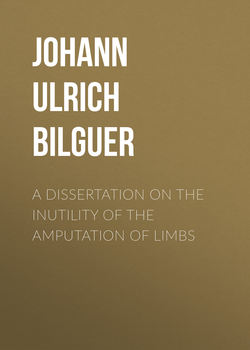Читать книгу A dissertation on the inutility of the amputation of limbs - Johann Ulrich Bilguer - Страница 7
SECT. IV
ОглавлениеBut supposing, what I do not apprehend can be the case, that all the gentlemen of the profession should agree in declaring my method absolutely useless, the rest of mankind at least, will be obliged to me for my endeavours to mutilate the wounded as little as possible; as most people are shocked at the mention of any amputation, or at the sight of a poor creature who has lost an hand, an arm, a foot or leg, wretchedly crawling along upon crutches or a wooden leg; and consider the total privation of a limb, as a much greater misfortune than when it is preserved, though perhaps unshapely, and uncapable of performing several of its primitive functions. If one reflects how much every body dreads the pain occasioned by the slightest incision, he will easily conceive the degree of horror a person must feel at the thought of amputation, and why many patients chuse rather to die than to submit to it2. Hence it is so uncommon to find men, like count Mansfeld, so famed in the war that lasted thirty years, who caused his wounded arm to be taken off amidst the sound of trumpets and beating of drums; or like the country fellow, whom Dr. Schaarschmid, late an eminent physician at Berlin, mentions in his collection of observations and remarks on physic and surgery, who cut off his own mortified leg with a saw, very unfit for such an operation3.
2
I would not chuse to lay much stress on this argument; for if one weighs the circumstances of pain, the amount of what the patient suffers from the treatment necessary for saving the limb, will often be equal to that arising from amputation. But the two strongest reasons for prefering Mr. Bilguer's method is, the saving the limb as well as the life of the patient; the loss of which is often occasioned by amputation, but never by the pain of an incision. It is also true, that pain when slighter, though longer continued, is more easily supported by the patient. Tissot.
3
To these instances may be added, that of the son of Thomas Koulichan, a captain in the Austrian service, who, being wounded in the leg, and the bones shattered, in one of the latter battles of the war, held a candle with one hand and extracted the splinters with the other. He exhibited many other proofs, not only of courage in the field, but also of that fortitude in bearing pain which is very different from the other, and much more seldom met with. Tissot.
